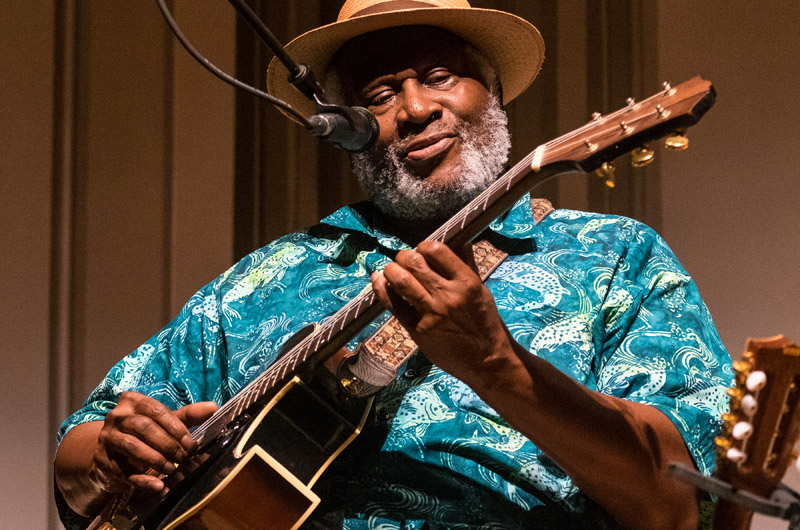You get the impression, after a brief conversation with musician Taj Mahal that touched on farming, non-linear time, tuna fishing, philanthropy and airplane motors, that he could spin intelligent discourse for several hours without landing on a tired idea or a worn out theory.
Taj Mahal is a blues musician in the way that blues is part of all American music. His music starts with the blues, but travels an adventurous route through the Caribbean, Africa and the South Pacific. Blues musician doesn’t begin to describe him. A lot of people have tried to put a label on him. All have failed.
“Good,” he said. “That’s why I’m still working. Labels don’t do nobody no good. They’ll go out of style and something else will replace it. The music came first. Nobody needed to label it. How come I feel this music? How come when the changes come, I recognize the changes and I understand what’s going on? That’s all I’ve ever done. If you can feel it, why do you need to define it?”
Last Friday’s performance at the Whaling Church in Edgartown was the 68th of 102 scheduled gigs in 2016, a tour pace that keeps him on the road 11 months out of the year. Already this year, he has played in 20 states and nine foreign countries.
He has been more or less on the road since he began his career five decades ago. Just as he doesn’t have much use for musical labels now, he didn’t have much use for record labels then.
“I’ve been a traveling musician since the end of the ‘60s,” he said. “I made a living. It’s not the easiest one. A record company will say sure, give us a hit, and we can throw it out there and we’ll make all the money and eventually we’ll let you make some. No. I would rather take my chances the way I’ve been doing it.”
He doesn’t appear all that concerned about where others take the music industry, but he does feel that many of today’s artists have missed an opportunity to explore their musical heritage.
“It seems as though this culture says that music, culturally, is not good enough until it’s liked by the dominant culture and something is created out of it that comes to be commercially successful. This music has sustained a group of people for 1,000 years. It’s timeless. I’m not trying to please some sort of demographic that only wants to hear things within a narrow space.”
He was born in Harlem, but grew up in Springfield. As a young man, he studied agriculture, and worked on dairy farms. He is part of an effort to distribute surplus crop seeds so impoverished people can grow food.
“I love the idea of small farms, people paying attention and loving the soil, stewards of the land, and aware of how they fit into the ecosystem that they work in.”
As he grew up, he heard much about Martha’s Vineyard and its multi-cultural legacy. But it wasn’t until late adulthood that he visited the Island, drawn by sport fishing as much as anything else.
Taj Mahal is a man of many interests, but the calling has always been music. He has an astute sense of history, though he doesn’t measure it in an unfolding timeline. He no longer thinks of time as linear.
“What am I supposed to be doing,” he asked rhetorically. “Playing the music. Communicating with the ancestors. Communicating the ancestors’ information to the time that I live in, developing things in this time.”
You get the impression that there is not a sound wave that ever reverberated through the air unfamiliar to him, that he can’t feel.
A sight-seeing biplane flies over his modest Edgartown rental cottage, and he instantly identifies the radial cowl engine powering the aircraft.
“It’s a great sound, man.”





Comments (6)
Comments
Comment policy »